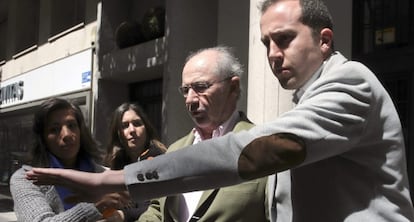Bankia will ask court for freeze of former IMF chief Rato’s fortune
Ex-politician facing charges of money laundering, tax fraud and asset stripping

The future of the estimated €26.6 million amassed by Rodrigo Rato, a former International Monetary Fund (IMF) chief and one-time senior official with the Popular Party (PP), is resting in the hands of the Spanish bank he once headed.
José Ignacio Goirigolzarri, who took over from Rato at the helm of Bankia after the lender had to be partly nationalized in 2012, is planning to take Rato to court to demand €133 million, representing a sixth of the €800 million bond required by the High Court to cover Rato’s civil liability in the Bankia flotation case.
Although Rato was initially being investigated for his role in getting the struggling lender trading on the Madrid stock exchange, a move that may have involved document forgery and other crimes, the former economy minister and deputy prime minister under José María Aznar has since become the target of several other probes.
Rato still an advisor at Telefónica
As soon as Bankia was nationalized, Rato joined three corporate giants that trade on the blue-chip Ibex 35 bourse in an advisory capacity.
In January 2013 he began earning €200,000 a year as an external advisor to Telefónica’s Europe and Latin America division.
Then, in September 2013, he joined Banco Santander first and then La Caixa, making similar salaries at both.
When his legal situation began to get complicated, La Caixa rescinded his contract in August 2014. Santander did the same in November 2014.
The man who was once described as the architect of the Spanish economic miracle is now also under scrutiny for the abuse of company credit cards by Caja Madrid and Bankia executives while he was chairman of both lenders.
And last week, the Madrid Attorney’s Office leveled accusations of money laundering, tax fraud and asset stripping against him, leading to his brief arrest on Thursday while his home and office were searched for documentary evidence of financial wrongdoing.
This development followed news that Rato applied for a 2012 tax amnesty sponsored by his own party, and may have used it for money laundering purposes along with 704 other people currently under investigation.
On March 17, Rato deposited the bond required by court in connection with the Bankia flotation case, but appealed it. A decision on the appeal is expected on Friday of this week, according to news agency Efe.
But sources at Bankia said that their civil lawsuit to get their money from Rato will go ahead regardless of whether the High Court hands down a decision this week or not. This could lead to a freeze on all his assets.

The only thing that could save Rato now would be for the court to cancel or reduce the bond.
Prosecutors suspect that Rato had been transferring assets to his relatives’ names precisely in order to preserve his wealth from future bonds he might be asked to post in connection to all these investigations. The credit card case has already forced him to post another €3-million bond, although this amount was provided by a cousin of his whose family made its wealth from shipbuilding.
Sources at Bankia said they do not expect to get the full €133 million, since Rato is not believed to have this amount of money. Instead, they want his assets to be properly identified and tallied, and for him to stop living a life of luxury while the bank that had to be bailed out with over €22.4 billion of taxpayers’ money continues to struggle with the consequences of his mismanagement.
Rato himself has denied having the €26.6 million that the Tax Agency estimates his fortune at.
Tu suscripción se está usando en otro dispositivo
¿Quieres añadir otro usuario a tu suscripción?
Si continúas leyendo en este dispositivo, no se podrá leer en el otro.
FlechaTu suscripción se está usando en otro dispositivo y solo puedes acceder a EL PAÍS desde un dispositivo a la vez.
Si quieres compartir tu cuenta, cambia tu suscripción a la modalidad Premium, así podrás añadir otro usuario. Cada uno accederá con su propia cuenta de email, lo que os permitirá personalizar vuestra experiencia en EL PAÍS.
¿Tienes una suscripción de empresa? Accede aquí para contratar más cuentas.
En el caso de no saber quién está usando tu cuenta, te recomendamos cambiar tu contraseña aquí.
Si decides continuar compartiendo tu cuenta, este mensaje se mostrará en tu dispositivo y en el de la otra persona que está usando tu cuenta de forma indefinida, afectando a tu experiencia de lectura. Puedes consultar aquí los términos y condiciones de la suscripción digital.








































